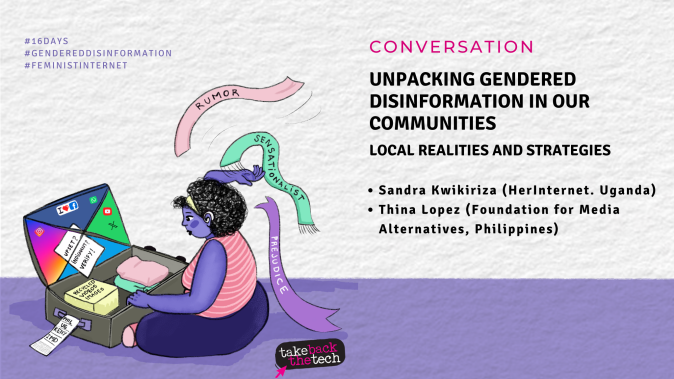Narratives that create connection, not conflict

In December 2023, we spoke to activists in Brazil, Guatemala, Bolivia, Uganda, and Kenya about gender-targeted disinformation. In these conversations, the main goal was listening to lived experiences and possible practices to fight against mis and disinformation. Women human rights defenders (WHRD) Andrea Ixchiu, Lori Regattieri, Raisa Valda, Sandra Kwikiriza and Thina Lopez participated in the conversation.
Disinformation, as defined by Sandra, is the deliberate dissemination of false information with the intention of causing harm; misinformation is the dissemination of false information without the intention of causing harm. When approached from a gender perspective, the damage can be even more complex and very dangerously escalating. During electoral periods, as commented by the participants, women who are in politics are the target of disinformation attacks, which use their gender to destroy their reputation in society: in the form of fake images, videos or audios, and which often depicts nude or pornographic images. Violence is twofold: it is false, it seeks to cause harm, and above all, it can portray revenge pornography.
"Pornographic videos or photos and even the tone of our voices and cropped video clips can also be manipulated, and this can happen in a coordinated way to destroy a woman's character, and also to publicly scrutinize and attack our physical appearance." - Thina Lopez.
The attack on women in public positions is not restricted to any geography: from north to south, women's bodies are targets for scrutiny. Thina also commented that during the elections in her country, the Philippines, more and more women became targets, whether they were politicians, or journalists, or human rights defenders, and of course, any ordinary woman. Something also mentioned by Lori Regattieri in the political scene in Brazil, or by Raísa, in the political scene in Bolivia.
But who are the people responsible for the harmful information? Or even, who should be responsible or take action regarding them? We know that the current patriarchal power supports the same narratives to preserve its own system: the stories told or replicated have a social impact and increasingly new tools for sharing old practices perpetuate what we already know: an intersectional system of oppression .
In the context of feminist struggles and sexual dissent, disinformation not only manifests itself in the distortion of realities, but it is also something that permeates silences, as mentioned by Lori and Andrea: the silences of the media, of the great actors, and this is because they they are a power filter - so when we are thinking together about disinformation we are doing something revolutionary, and consequently uncomfortable, but very strong and powerful, since this is going against the powers that are historically consolidated.
Gender misinformation often translates into the reproduction of discourses that want to incite violence against female or dissident bodies, and in most cases, to silence these bodies, and keep power exactly where it is. An intersectional view on disinformation is important in order to critically think and construct the narratives that permeate us socially, and furthermore, view them as living systems.
"Narratives are stories that relate to each other, they are the logic, ideologies, values, metaphors and common meanings that shape the world we live in. The stories we tell have a huge impact on how things happen in the world and that is why it is important to learn the types of harmful narratives that lead to harmful results for both people and territories and, from there, hack these narratives." - Andrea Ixchiu.
To create new narratives, create networks of distrust .... ones that distrust and question. To share and tell stories, occupy spaces, strengthen communities and even permeate open platforms as a mechanism for creating accessible knowledge for everyone.
- Log in to post comments
